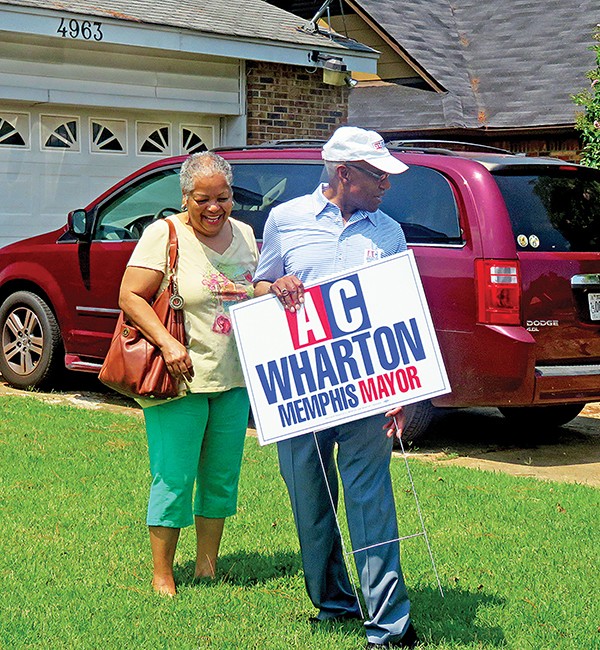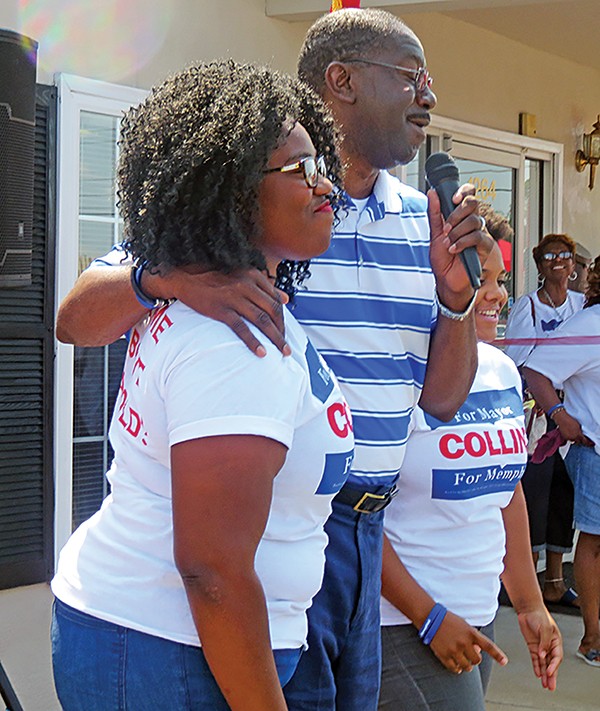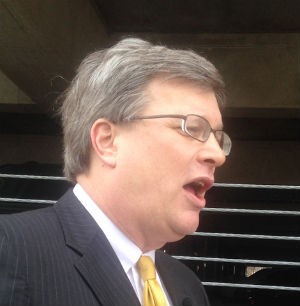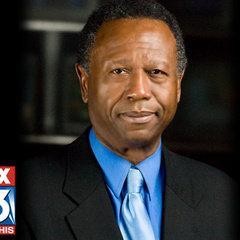Bobby Lanier, one of the most significant figures in Shelby  JB
JB
Bobby Lanier in 2015
County political history and one of the most personally revered as well, died on Saturday, December 28th, after several years of failing health (more to come). Hopefully, some measure of the man can be gained from this profile of Lanier in the Memphis Flyer issue of October 17, 2002:
The Man to See (published October 17, 2002)
by Jackson Baker
For decades, Bobby Lanier has been the preeminent behind-the-scenes presence in County government.
It is a small weekday luncheon in the Plaza Club, sponsored by the Greater Memphis Area Chamber of Commerce and featuring the still new mayor of Shelby County, A C Wharton. The audience of engineers, architects, and other construction-industry types listens attentively as the nattily dressed, crisp-looking Wharton expounds on the problems confronting him — a narrowed economy, the issue of school construction, the property-tax threshold, the issue of Interstate 69, what-have-you. After working down the list, he expresses confidence that, “with the help of people like Bobby Lanier,” he can solve them.
This bouquet, he extends with a slight toss of his head toward a distinguished-looking white-haired man sitting at one of the round tables nearby, just to the left of the one seat — the mayor’s — that is unoccupied. Lanier nods his acknowledgment of the compliment ever so slightly, the line of his mouth set tight but ready for mirth, the eyes possessing a watchful twinkle, his focus altogether on Wharton, as ready to indicate a dessert choice for the mayor (cheesecake) as to answer when the mayor wonders out loud which country club “out in Collierville” he had recently visited with 9th District congressman Harold Ford Jr.
“Ridgeway,” says Lanier definitively, and Wharton proceeds with a tale of that visit, the point of which is to express appreciation and awe that, in his and the audience’s lifetime, two African-American officials, a mayor and a congressman, could be making such a joint appearance as the duly elected representatives of a predominantly white suburb.
Wharton does not spell it out, but as denizens of the world of politics know, this, too, was achieved with the help of Bobby Lanier. (In a piece of synchronicity which seems to underscore this fact, Mike Hankins, one of the construction executives attending the luncheon, puts a hand on Lanier’s shoulder on his way out and says to Wharton, “Mayor, this guy has all the locks and all the keys.”)
In a sense, as Wharton had confided to a reporter early this year, Lanier had been the architect of his candidacy and the prime mover of his campaign. “He’s the one who urged me to run,” said the then-Shelby County Public Defender, detailing the several phone calls that passed between the two in the early summer of 2001 as it became obvious to Lanier that incumbent mayor Jim Rout would not be seeking reelection.
Lanier was then serving Rout as executive assistant, a title he held during the several terms of Rout’s predecessor, Bill Morris, and the title he holds today. “He’s the glue,” as mayoral legal counsel Kelly Rayne puts it. “He got things done,” says Morris. “I take care of problems,” says Lanier. In an almost archetypal sense, he’s the man to see in Shelby County government, and he has been since the day in 1978 when Morris invited Lanier, then serving as a Germantown alderman and nearing retirement as a 25-year employee of Memphis Light Gas & Water, into his mayoral campaign as an all-purpose aide and factotum, then, as now, first among equals. (Arguably, he had a peer in the currently embattled Tom Jones, the communications-and-policy aide for Morris and Rout.)
“I remember when Mayor Rout made his announcement in July 2001,” Lanier says. “I took John Bakke aside and said, ‘I’ll tell you who the next mayor’s going to be.'” Bakke, of course, is the communications guru who has had a hand in an astonishing array of successful election efforts, ranging from those of U.S. Rep. Harold Ford Sr. in the ’70s to those of former 7th District congressman and current Tennessee governor Don Sundquist in the ’80s and ’90s. “I can work with him,” Lanier quotes Bakke as saying about Wharton, and so Bakke would.
On the same day that he had that conversation with Bakke, Lanier accompanied Rout to an affair at the Homebuilders headquarters building in Cordova, where, before a large and festive crowd composed largely of political allies and developers, Rout repeated the formal withdrawal announcement he’d already made in the boardroom of his mayoral office.
Lanier recalls, “One of the developers said to me, ‘I guess Harold Byrd’s going to be the next mayor,’ and I said, ‘No, the next mayor hasn’t announced yet.'”
At the time, Bartlett banker Byrd, a Democrat and former state representative and congressional candidate, was already in the field raising money and developing a head of steam as Rout’s putative successor. Not long after Rout had withdrawn, Byrd made a fund-raising call on Millington’s W.S. “Babe” Howard, a wealthy businessman and philanthropist and a pillar of the county Democratic establishment.
“I’d like to help you,” Byrd was reportedly told by Howard, “but I owe Bobby too many times.” Byrd started getting the same message in other places, and he would later, in an agonizing decision made on the eve of the withdrawal deadline earlier this year, be compelled to withdraw, as another prime prospect, state Senator Jim Kyle, had earlier. Wharton would go on to beat easily both state Representative Carol Chumney in the Democratic primary and radiologist/radio magnate George Flinn, the surprise Republican nominee, in the general election.
Though Byrd declines to speak for the record about the matter, his bitterness is well known concerning both Lanier and Wharton, who he believes misled him about his ultimate intentions of running. Lanier gives a different interpretation to the actions of Wharton, who served as Shelby County Public Defender under both Morris and Rout. “He just didn’t want to run against his boss,” as Lanier puts it.
Lawyer Jim Strickland, the former Democratic Party chairman who served as Byrd’s campaign manager, remembers telling his candidate long before Wharton’s entry, when it was assumed that Rout would still be running, “Gee, Bobby’s such a nice guy and so effective. We ought to consider keeping him on after you’re elected.”
But after Lanier, still serving as an aide to Rout, came front and center as Wharton’s chief backer, Strickland and another Byrd supporter, lawyer Richard Fields, charged that Lanier was violating county ethics codes by making fund-raising calls from his office in the county administration building.
During the resultant brouhaha, Lanier chose to resign and work full-time in Wharton’s campaign. “I didn’t want to cause any problems for the mayor [Rout],” he says. It was the first break in his county employment since 1978, when he first occupied the eighth-floor office adjacent to the mayor’s. For the duration of the campaign, he was replaced as a mayoral aide by Rout ally Ron Banks (now working as an administrator in the Juvenile Court office).
This week, Lanier sat in the office chair he was restored to by Wharton and recalled, of the charges made by Strickland and Fields, “I made some calls from here. Sure, I did, but I didn’t raise any money up here.” He shrugged. “I don’t know many politicians that don’t make calls from their office.”
As Rayne said, Bobby Lanier is the glue. Extending that metaphor, she says, “He’s invisible most of the time and keeps things together. He’s also the sander. He smoothes out the rough edges. They don’t know me. I’m just a bureaucrat downtown. They know him, however. He works things out.”
Case in point: Her observation had been preceded by a conversation with Lanier over a vexing land-use issue involving the municipalities of Memphis and Germantown. The two of them had discussed the case at length, and Lanier had evinced not only an understanding of the details, some of them highly technical, but gave her elaborate advice concerning which officials to put in touch with which others to sand out the edges.
“I believe in getting people together to work out things. I always have and always will,” says Lanier, not, by his own testimony, a policy-maker per se but one who can do what it takes to implement a policy, once it’s been decided on. When there was an impasse on the Public Building Authority several months ago as to which contractors should be employed on the city’s new NBA arena, it was Lanier who stepped in, blandishing here and coaxing there, getting the right people together to work things out to the end of an eventual compromise.
Though little seems to vex the mild-mannered Lanier, he is plainly regretful in discussing somebody’s negative reaction to him, whether it be Byrd’s passing by him without speaking at a recent Peabody luncheon for Democratic gubernatorial candidate Phil Bredesen or the outburst of Criminal Court clerk Bill Key during the campaign, when Key, then the target of some unfriendly yard signs tripling the initial of his last name, pointed at Lanier’s “A C” button and made some disparaging remark about “you Democrats.”
Says Lanier, “I told him, ‘Don’t be accusing me of being a Democrat. I’m for A C Wharton.’ And I told him, ‘Bill, you’ve got to stop acting like you’re mad at everybody. You’ll get beat. You can catch more flies with sugar than you can with vinegar.'”
Lanier’s equanimity has also been tested by the reaction of some Shelby County Republicans who, like newly elected county commissioner John Willingham, believe, as Byrd and some other Democrats did, that Lanier is the prime Good Ole Boy in a veritable G.O.B. network that has extended from mayoral regime to mayoral regime, always including the same contractors and developers, the same financial donors, and the same financial beneficiaries.
Willingham and other members of the G.O.P. populist right believe that Wharton was the handpicked candidate of this network and that Lanier was the Machiavelli who made sure he ended up being mayor. They also are convinced that Rout, who publicly endorsed the mayoral candidacy of then-state Representative Larry Scroggs in the Republican primary and was cool to the candidacy of eventual Republican nominee George Flinn, was in on the Wharton plan and that the mayor’s other campaign moves were merely diversionary.
Rout has denied this, as does Lanier, and he maintains about Willingham, “John and I get along fine. If John’s going to pop off, that’s fine, but I make it a point to get along with all the commissioners.”
Bobby Lanier has always got along. Before Morris tapped him for campaign duty in 1978 — on the basis of his experience working with Lanier in the Jaycees — Lanier had served several terms as a Germantown alderman, finishing always at the top of the vote slate. He was head of the city’s volunteer Fire Department and was, as he still is, president of the Germantown Charity Horse Show — one of three nongovernmental institutions (the others being the Mid-South Fair and Germantown Presbyterian Church) that he has always made time for.
Not bad for a dairy farmer’s son who never attended college (though, in adulthood, he took some evening classes offered by the University of Tennessee here). As Morris says, however, “He was a football hero,” the captain of his 1947 Germantown High School team who averaged five yards a carry during his senior year and whose stern mien in his vintage football pictures is some indication, perhaps, of the iron will that some say lies beneath the easy-going exterior.
“All I wanted to do was be a dairy farmer like my father,” says Lanier, who in the aftermath of his father’s death found himself working with MLGW, doing — what else? — community-relations work. He was also a fixture at Germantown City Hall, arriving early in the morning for coffee and staying until late at night, learning what he could about government and not being bashful about giving advice. Black-haired and crew-cut in those days, he soon made himself indispensable.
For all the long hours, though, he never stinted on his family, he and friends say. “I never missed a single one of my son’s football games,” Lanier says of Robert Cox Lanier the Second (that’s how he was christened), now a funeral director in Alabama. And Morris recalls Lanier spending considerable time each day dressing his wife Pat, who was crippled by arthritis and had a long, lingering illness that ended with her death in 1999, one year after the couple’s 50th wedding anniversary. The enormous crowd that filled Memphis Funeral Home in East Memphis on that occasion included a virtual who’s who in Shelby County politics and government.
Wharton is unstinted in his praise of Lanier, both the governmental aide and the campaign guru: “He was invaluable in the campaign, especially in Shelby County, which he knows like the back of his hand. He knew exactly who might be for us and where we’d be wasting our time. He was a perfect liaison to the outer county, and he dispelled everyone’s fears. He told me when he first started talking to me about running that I would end up with 60 percent of the vote, and he knew just how that would come about.”
An aide in one of the other mayoral campaigns saw things from a slightly different angle. “Bobby’s the go-to guy, and that includes the financial end. All those people who have to see him to get things done, he makes a list of, and later on, he calls them and hits them up for campaign money.”
In the 73-year-old Lanier’s own reckoning, he is just a public servant, content to do what he does out of the limelight, the benevolent white-haired presence who has always been just a step behind the mayor of Shelby County, just an office removed. “I’ve heard people say, ‘Why are you, a white man, at your age, working for a little black man?’ The only reason I helped A C Wharton was because I thought he was the best man for Shelby County, the man who can bring us all together.”
Everything he does is just, says Lanier, a continuation of the habits he formed as a county agent for MLGW, when he was on the same kind of 24-hour call as he is today. “People still call me about Light, Gas & Water problems right now,” he says. “Everybody seems to think I can do anything. Well, I do try to help.” During the 1994 ice storm, he recalls, he asked then-MLGW director Bill Crawford for some repair personnel. “I said, ‘Bill, you give me a crew, and I’ll get these lights on out there in Collierville and the suburbs. And he did, and I did. In three or four days.”
Lanier’s willingness to be of help had sometimes caused him some grief, as when he was indicted along with then-Mayor Morris, during the latter’s 1994 gubernatorial run, for improper use of prison inmates to serve meals at campaign functions. In the shakeout of that scandal — prompted, it was always said, by partisans of rival candidate Phil Bredesen — Lanier ended up the fall guy, with an eventual misdemeanor conviction, which was probated.
He was on the prong of another controversy just last year, when Shelby County Commissioner Michael Hooks was found, by sheriff’s deputies investigating a traffic mishap, to have cocaine paraphernalia in his home. In the fallout, it developed that Hooks had called Lanier, who in turn called then-Chief Deputy Don Wright, who had a misdemeanor citation issued for Hooks, who was spared the embarrassment of arrest. (The commissioner has since staged an apparent full recovery from his acknowledged cocaine addiction.)
Lanier professes the most innocent of motives. “I didn’t even know what it was all about,” he says. “Michael just called me and, without telling me anything, asked for Don Wright’s phone number. Instead of just giving it to him, I called Don and asked him to call Michael, but I never knew what was going on.”
That may strain the credulity of some, but Bobby Lanier seems utterly sincere in the telling of this version.
Lanier has made many an admirer for his willingness to be at the beck and call of Shelby County’s chief executives, picking them up at their homes and personally driving them to their destinations. But all is not self-sacrifice in the saga of Bobby Lanier. His political connections have been useful to him in landing some investment opportunities, most notable in 1973 when he and a number of other local civic and political figures founded the Community Bank of Germantown. Lanier and the others, who included congressman-to-be Sundquist, made what everybody acknowledges was a considerable fortune when they sold the bank in the ’90s to the First Tennessee Corporation.
Septuagenarian Bobby Lanier intends to keep on keeping on, presumably for two full terms of Mayor A C Wharton. And who knows beyond that? Though he rarely has time to do any recreation beyond an occasional charity round of golf, he looks remarkably fit. And he probably hasn’t lost the nerve that once prompted him, for reasons he can’t explain, to stand atop the fiberglass roof of a fire truck and touch two live wires overhead, letting 500,000 volts pass right through him. “You see, I wasn’t grounded,” he says.
His once and future job as right-hand man to the mayors of Shelby County does ground him, of course. “As I tell people, the door’s open all the time. It’s very seldom otherwise. People come up to see the mayor, and when they can’t, I go out to see ’em. They need to see somebody.”
For now, both Bobby Lanier and A C Wharton are quite comfortable with Lanier’s being that somebody.
Go here for original online article.
 Jackson Baker
Jackson Baker  Jackson Baker
Jackson Baker 


 Toby Sells
Toby Sells 